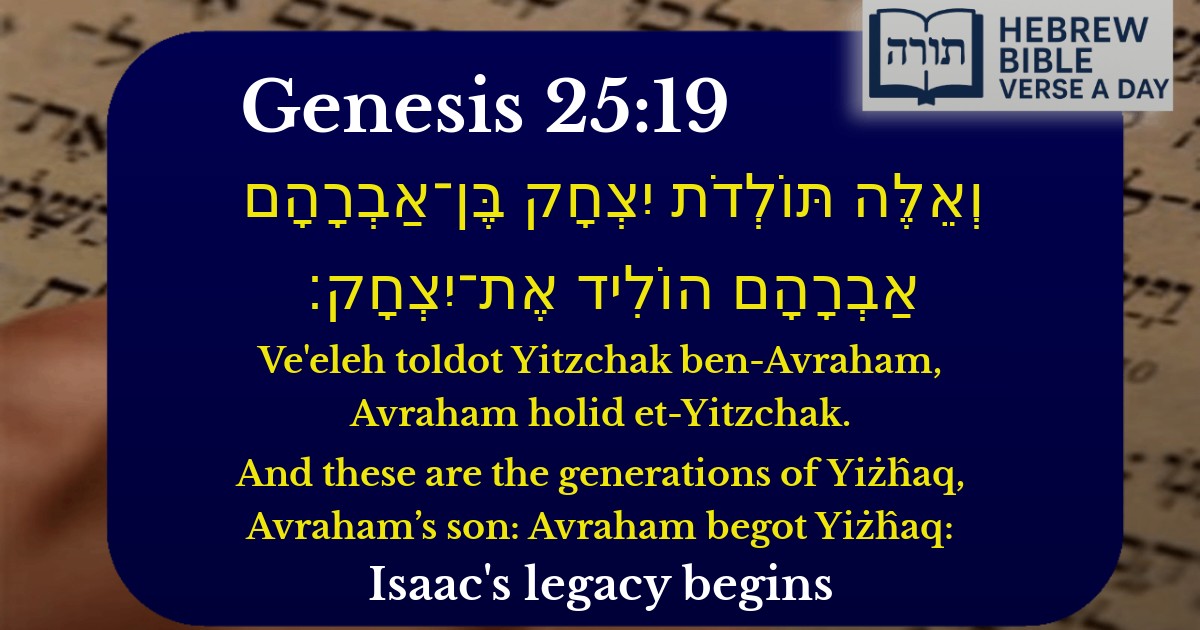Join Our Newsletter To Be Informed When New Videos Are Posted
Join the thousands of fellow Studends who rely on our videos to learn how to read the bible in Hebrew for free!
Hebrew Text
וְאֵלֶּה תּוֹלְדֹת יִצְחָק בֶּן־אַבְרָהָם אַבְרָהָם הוֹלִיד אֶת־יִצְחָק׃
English Translation
And these are the generations of Yiżĥaq, Avraham’s son: Avraham begot Yiżĥaq:
Transliteration
Ve'eleh toldot Yitzchak ben-Avraham, Avraham holid et-Yitzchak.
Hebrew Leining Text
וְאֵ֛לֶּה תּוֹלְדֹ֥ת יִצְחָ֖ק בֶּן־אַבְרָהָ֑ם אַבְרָהָ֖ם הוֹלִ֥יד אֶת־יִצְחָֽק׃
וְאֵ֛לֶּה תּוֹלְדֹ֥ת יִצְחָ֖ק בֶּן־אַבְרָהָ֑ם אַבְרָהָ֖ם הוֹלִ֥יד אֶת־יִצְחָֽק׃
🎵 Listen to leining
Parasha Commentary
📚 Talmud Citations
This verse is quoted in the Talmud.
📖 Bava Batra 91a
The verse is cited in a discussion about the lineage and descendants of Isaac, emphasizing the direct paternal line from Abraham to Isaac.
📖 Sanhedrin 58b
The verse is referenced in a discussion about the unique relationship between Abraham and Isaac, highlighting the continuity of the covenant.


Repetition of Avraham and Yitzchak
The verse states, "And these are the generations of Yitzchak, Avraham’s son: Avraham begot Yitzchak" (Bereishit 25:19). Rashi notes the apparent redundancy—why mention both that Yitzchak is Avraham’s son and that Avraham begot Yitzchak? He explains that this repetition comes to counter the claims of the scoffers (led by the nations who doubted Yitzchak’s lineage due to Sarah’s advanced age). The Torah emphasizes that Avraham was indisputably Yitzchak’s father, and Yitzchak was his rightful heir.
Yitzchak’s Unique Status
The Midrash (Bereishit Rabbah 63:1) highlights that Yitzchak is the only patriarch whose lineage is explicitly tied to his father in this way. This underscores his unique role as the continuation of Avraham’s covenant. The Ramban adds that the phrasing "Avraham begot Yitzchak" reinforces that Yitzchak was the sole inheritor of Avraham’s spiritual legacy, unlike Yishmael or the sons of Keturah.
Themes of Continuity and Divine Promise
Grammatical Nuance
Ibn Ezra observes that the phrasing "Avraham begot Yitzchak" (rather than simply listing Yitzchak’s descendants) serves to connect the narrative directly back to Avraham, reinforcing the unbroken chain of mesorah (tradition) from father to son. This structure mirrors the transmission of Torah values through generations.